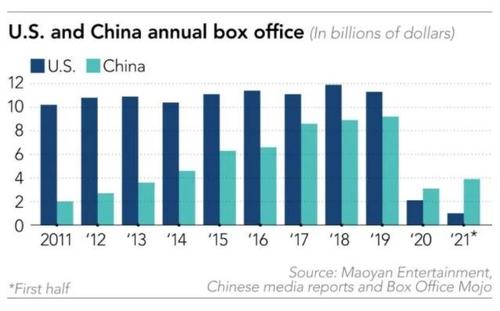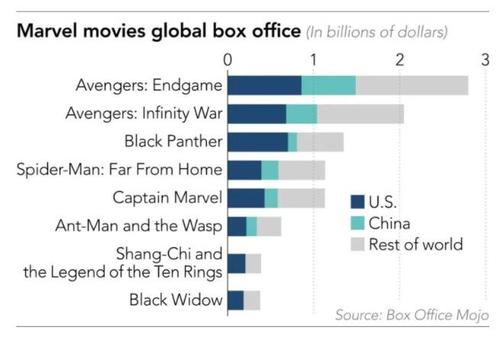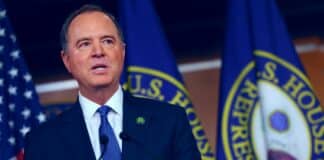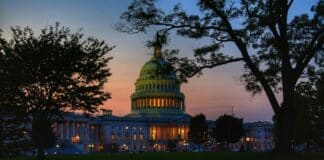Film productions have been routinely tweaking scenes to make China favorable to them — all for nothing.
Just like American political leaders and financial giants, Hollywood has also misjudged China’s intentions. After Dalian Wanda’s takeover of the American production company Legendary Entertainment, some warned that Beijing was trying to subvert American audiences’ opinion of China by injecting subtle Chinese propaganda into American films.
But it turns out, Beijing and President Xi had no intentions of embracing Hollywood: instead, it appears they’re trying to keep Chinese consumers from absorbing Hollywood’s decadent cultural values. Which is why American films have been increasingly blocked from being shown in the Chinese entertainment market in recent years.
According to a report by Nikkei, while Hollywood studios hoped China would be a major growth market for blockbuster films, China’s censors have been extremely selective about which films they allow to be screened in the world’s second-largest economy, whose box office revenues surpassed America’s in 20202 (thanks, in major part, to the pandemic).


Just like NBA players, who need to watch what they say about sensitive issues like Hong Kong, Hollywood actors need to be careful about touching a nerve. When John Cena accidentally referred to Taiwan as “a country” in a promotional clip for “Fast & Furious 9”, he nearly cost the studio more than $200MM. It ended with him begging for the CCP’s forgiveness for his honest mistake.
Although unpredictable, China has been a major factor in decision-making for American studios. Film productions sometimes tweak scenes to get access to China. A trailer for the sequel to the 1986 blockbuster “Top Gun” suggested that Japanese and Taiwanese flags on the leather jacket of the main character, Maverick, had been removed to avoid touching a nerve with Chinese regulators. In June, “Fast & Furious 9″‘ star John Cena apologized to Chinese fans for referring to Taiwan as a “country” in a promotional video for the movie. “Fast & Furious 9” made nearly $204 million in China and $173 million in the U.S.
Sometimes, anticipating how the Chinese audience will react to a film can be difficult. Take “Shang-Chi”, which was widely praised for its all-Asian cast. The movie was widely criticized in China, despite taking in hundreds of millions of dollars worldwide.
Studios and stars often find themselves drawn into controversy on Chinese social media. With a nearly all-Asian cast, “Shang-Chi” was well reviewed, widely appreciated and lucrative: Its U.S. box office had topped $200 million and it had brought in $388 million worldwide as of Oct. 5, according to Box Office Mojo. But as it was being promoted overseas, China’s netizens criticized the stars, Simu Liu and Awkwafina, for failing to conform to traditional Chinese beauty standards, and also the villain, the Mandarin, for being a stereotype. Some reviewers in the U.S. had similar criticisms of the Mandarin — a heavily reworked version of the Marvel comic strips’ Fu Manchu — but Chinese actor Tony Leung received particularly heavy criticism on Chinese social media for the role before the film was released.
And while Marvel movies have been hugely popular in China, some fear the upcoming “Eternals” movie may be blocked by Chinese censors.
Some suspect the upcoming “Eternals” faces difficulty securing a release date because its director, Oscar-winning China native Chloe Zhao, was criticized for making an unflattering comment about her homeland during an interview several years ago. The announcement of her Oscar victory was blocked on the Chinese internet as well. It remains unclear if Chinese moviegoers will be able to watch “Eternals” this year. “If I was an investor, I would be very concerned about a strategy at this point that depended on access to the Chinese market and the good graces of Chinese film regulators,” said Aynne Kokas, the author of “Hollywood Made in China” and a media studies professor at the University of Virginia. “To make very expensive films in anticipation of being able to deliver them to the Chinese market and then not being certain that’s possible is actually a much more financially irresponsible strategy from my perspective.”
China’s censors only allow a quota of 34 foreign films to be released in mainland China each year. Despite years of negotiations between regulators in Hollywood and China’s censors, Beijing has refused to change the quota. Beijing also has caps on foreign content on the country’s streaming services.
What’s more, Beijing’s recent crackdown on its own entertainment industry (banning depictions of “sissy” men while erasing one of the country’s most popular actresses from the Chinese Internet) further supports the fact that Beijing has a very clear idea of what entertainment should be permitted and what should not.
“You look at all of the criticisms of the so-called sissy boys, the closing down of the K-pop fan clubs, closing down of tutoring services that taught English, English not included in school final exams…It’s the atmosphere right now that foreign is dangerous, and Hollywood is subject to that as well,” said Stanley Rosen, a political science professor who specializes in Chinese politics and society at the University of Southern California.
And while Hollywood has so far depended on China for growth, Beijing doesn’t need Hollywood for anything. Already, homemade patriotic blockbusters have proven to be major hits in China, and abroad. For the past six years, domestic films have led the Chinese box office in revenue.
But if Hollywood still needs China, it is an open question whether China needs Hollywood. In the first half of 2021, China’s box office reached roughly $3.9 billion, according to the tracking app Dengta, and although the highest-grossing films used to be Hollywood blockbusters, domestic films have taken the crown for the past six years. “Hi, Mom,” a heartwarming Chinese movie about a woman going back in time in an attempt to make her mother’s life better, has the highest box office of 2021 worldwide so far, at $822 million.
Patriotic Chinese blockbusters have generated much revenue as well. “The Battle at Lake Changjin” raked in $203.2 million over the National Day weekend in China, according to Box Office Mojo.
So, American studios now have a difficult choice to make. They can start being more sensitive to the demands of the Chinese market. But such a “craven” approach would likely elicit a backlash at home, as politicians accuse Hollywood of putting profits over human rights.






